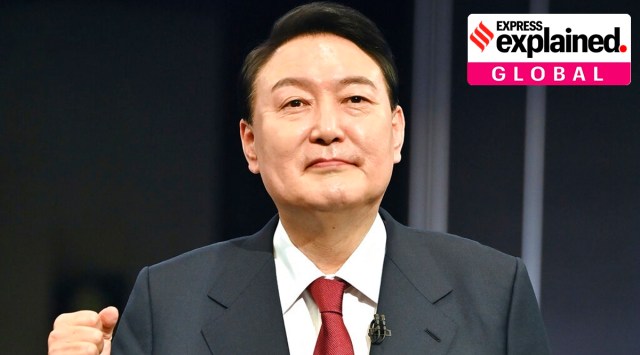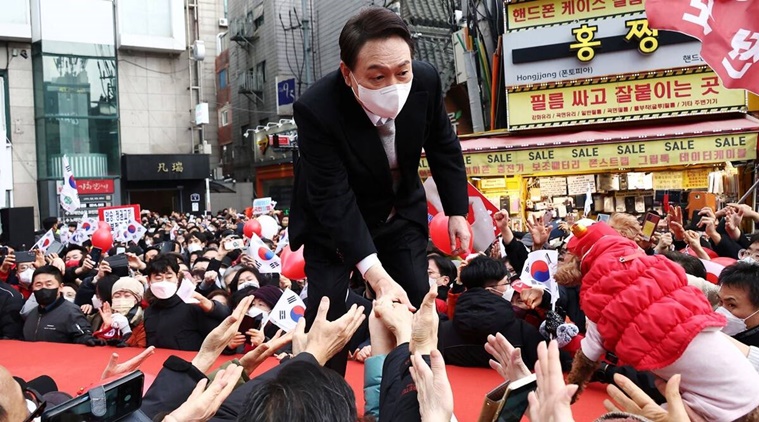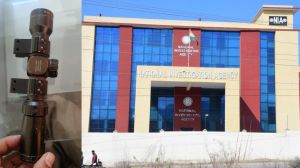Explained: What we know about South Korea’s new president Yoon Suk-yeol, and his proposed policies
As far as foreign policy is concerned, Yoon is more hawkish in his approach, particularly in comparison with President Moon Jae-in. Unlike President Moon, Yoon supports harsh sanctions on North Korea, in line with US foreign policy.
 President Yoon Suk-yeol became the first South Korean leader to attend a NATO summit, joining national NATO leaders as an observer at a meeting in Spain. (AP)
President Yoon Suk-yeol became the first South Korean leader to attend a NATO summit, joining national NATO leaders as an observer at a meeting in Spain. (AP)Yoon Suk-yeol, a conservative former prosecutor, is all set to become South Korea’s next president after his win in the country’s presidential election on Thursday, defeating his liberal rival. The 61-year-old won by a slim margin, edging out Lee Jae-myung. The results were the closest in the country’s democratic history, with the final vote count separated by less than 1 per cent.
These elections were particularly polarised and marked by scandals, but also had a high turn-out, with approximately 77 per cent of the eligible population casting their votes. Political analysts had observed that these elections had been the most negative in terms of the way they were fought: with a focus on mudslinging and personal verbal attacks rather than a criticism of policies and plans.
🗞️ Subscribe Now: Get Express Premium to access the best Election reporting and analysis 🗞️
Yoon served as the prosecutor general of South Korea from 2019 to 2021 under President Moon Jae-in. He also played a major role in the conviction of former President Park Geun-hye as the chief prosecutor of South Korea. His entry into the race last year was relatively late and only gained prominence during the political campaigning.
Polarised elections
There have been several observers and some publications that have drawn parallels between former US president Donald Trump and Yoon, particularly his style of speaking, which many found difficult to comprehend and follow during the campaigning.
Domestically in South Korea, there was a deep desire to see political change, analysts believe. But some experts believe that the slim margins by which Yoon won are indicative of just how deeply polarised South Korea’s political spectrum has really become.
There are several reasons why Yoon’s victory has caused concern among some sections in South Korea, and a lot has to do with the comments he made during the campaign and his proposals for the path forward.
During the campaign, one of the most severely criticised remarks by Yoon involved what many observers, including voters, interpreted as praise of former president Chun Doo-hwan, a military dictator who was known for his brutal treatment of pro-democracy protesters in the 1980s, for which Chiun never apologised till his death last year at age 90.
A Korea Herald report cited Yoon saying during the campaigning that there were many people who believe that Chun “did well in politics” except for the “military coups” and what he did on May 18, 1980, when he brutally suppressed a pro-democracy uprising. Yoon was later forced to apologise for these remarks.
Gender policies
During the campaigning, Yoon had pledged to abolish the Ministry of Gender Equality and blamed the rise of feminism and women being more assertive about their rights in South Korea for the country’s low birth rate.
South Korea is a country with one of the worst records on women’s rights in the developed world, and women in the country face violence and abuse in various forms inside their home as well as outside. Experts say that the country’s laws do not provide sufficient punishments for crimes against girls and women and that South Korea’s judicial system’s approach to crimes against women is linked to gender roles in the country’s patriarchal society.
 Yoon Suk-yeol, the presidential election candidate of South Korea’s main opposition People Power Party (PPP), shakes hands with his supporters during his election campaign in Seoul, South Korea, March 1, 2022. (Reuters)
Yoon Suk-yeol, the presidential election candidate of South Korea’s main opposition People Power Party (PPP), shakes hands with his supporters during his election campaign in Seoul, South Korea, March 1, 2022. (Reuters)
The stigmatisation of calls for greater emphasis on women’s rights by Yoon’s campaign has been popular with his voter base, many of them young men, who believe that he speaks for them.
Foreign policy
As far as foreign policy is concerned, Yoon is more hawkish in his approach, particularly in comparison with President Moon Jae-in. Unlike President Moon, Yoon supports harsh sanctions on North Korea, in line with US foreign policy, with Washinton being Seoul’s main diplomatic ally. Yoon has gone as far as to advocate for the development of military technology that would be capable of preemptive strikes on North Korea. Yoon had criticised Moon Jae-in’s policies towards North Korea as a “complete failure”.
While India did not directly find mention in Yoon’s foreign policy plans, he has proposed that South Korea should support and cooperate with the Quad security alliance between US, Australia, India and Japan. However, he has not openly stated whether South Korea has any hopes to join this alliance.
In November last year, Yoon had hinted at his potential plans for South Korea’s relations with Japan, in context of the country’s colonial history. “The issues between the two countries are not easy, but they are not impossible to solve….If the two countries approach them in a forward-looking manner, they can be solved for sure,” Yoon had stated.
During the campaign trail, Yoon’s critics had particularly attacked him for a lack of experience in party politics, foreign policy and other issues related to the state. This was one of the talking points, where comparisons were repeatedly drawn between Trump and Yoon. At that time, Yoon had said that he would let experienced officials handle matters that required expertise, but observers have questioned how much of that would be executed in actuality.
Domestic policies
On the domestic front, a report by The Korea Herald says that one of Yoon’s top agenda is dealing with Covid-19. The election process occurred at a time the country has been facing one of its worst waves of the coronavirus pandemic, pushed by the Omicron variant.
Yoon has pledged to establish a presidential committee dedicated to Covid-19 compensation immediately after his inauguration, and has promised to introduce new laws and revise related regulations to launch compensation programmes across the country.
Newsletter | Click to get the day’s best explainers in your inbox
Jobs and housing have been two main talking points of Yoon’s campaign, where he plans on setting up a government body overseeing regulatory reform to facilitate corporate investment. He also plans on easing labour regulations that he says will give companies and workers more flexibility.
A major point of concern, particularly for South Korea’s youth, has been housing and Yoon has stated that he has plans to stabilise the real estate market, which includes supplying 2.5 million new homes by 2026, a report by The Korea Herald said. This plan focuses on the capital Seoul and its surrounding regions, with up to 1.5 million homes being built in Greater Seoul, of which 500,000 will be located inside the capital, the report added.
- 01
- 02
- 03
- 04
- 05







































